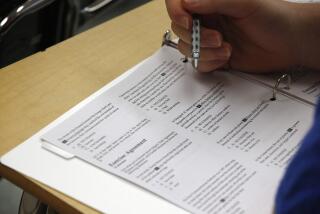Taking a stand on sitting out the SAT
- Share via
Hundreds of thousands of high school juniors and seniors are filing bleary-eyed into classrooms across the country this morning for the school year’s first seating of the SAT.
Meanwhile, hundreds of college admissions counselors just wrapped up their annual meeting in Seattle with a finding that standardized tests -- like the SAT and the ACT -- aren’t essential for admissions decisions.
What that means to today’s test takers is, unfortunately, nothing. Kids, keep your pencils sharpened and your calculators ready.
But students still in the pipeline can take heart.
I consider the counselors’ declaration a noble shot across the bow in the battle between a student-centered education system and a profit-driven standardized testing complex.
Their report, commissioned by the National Assn. for College Admission Counseling, urges colleges to consider making SAT and ACT scores optional in the admissions process.
Led by the dean of admissions at Harvard, the group is concerned that so-called aptitude tests have become the backbone of the admissions process, even though they’re little better than high school grades alone at predicting students’ performance in college.
That refrain has been heard before.
But this call goes beyond the traditional claim that standardized tests are biased against the poor, minorities or foreign-born.
The tests define merit too narrowly to fit this country’s increasingly diverse college-going population, the report said.
And their role in admissions has generated a testing obsession that is discouraging students, hijacking the admissions process and fueling the growth of a burgeoning test preparation complex.
Auti Soltani knows about that. The Granada Hills Charter High senior spent six weeks this summer -- four hours a day, three days a week -- in expensive SAT prep classes.
She’ll be taking the SAT for the second time this morning, along with 499 other students at Granada.
I met Auti and her friends, also Granada seniors, on Friday in the school’s college counseling center.
The test is “all anybody talks about,” when it gets close, said her friend Emily Cheng, who has taken it twice.
It’s become more than a test, the girls told me; it’s a social and academic barometer on campus.
“There’s all this pressure from your family, your classmates, your friends . . . like they expect you to get a perfect score,” said Taylor Goulding.
“Everybody’s always asking, ‘What’d you get? What’s your score?’ You’re tempted to lie and say you got higher than you did because you don’t want to be embarrassed.”
The girls gave me their peer group’s rundown on testing lore:
Test prep is essential, and a good course costs $1,000 or more.
If you can’t score more than 2000, on a scale of 2400, you might as well get in line for community college.
You can take it up to three times, but no more. “And even then, you wonder if that looks bad to the colleges,” said Taylor.
I’m surprised by their insecurities. They are, after all, AP and honors students, articulate and thoughtful young women, holding their own on the Los Angeles Unified School District’s highest-scoring campus.
The college admissions counselors’ report isn’t anti-test, by any means. The study lauded Advance Placement, SAT subject tests and International Baccalaureate exams as good ways to gauge students’ standing and measure learning.
But the study says scores from the SAT and ACT exams are used in ways that give them more importance than they deserve -- as the single factor in financial aid awards or to rank colleges in magazines studied by anxious parents and financial analysts.
That makes the admissions test scores too important to the bottom line and creates undue pressure on college counselors to pursue those kids who test the best, rather than the unconventional, creative geniuses.
Test makers won’t take this new challenge easily, I imagine. There is too much money to be made by the College Board and the billion-dollar test preparation industry, which markets everything from $2,000 courses to $4.95 iPod downloads.
But they’d better throw their bodies against the door, because there’s a tidal wave of second-guessing in the making.
Almost 300 of the nation’s colleges have already stopped requiring the exams, and the report is likely to unshackle others.
And while it’s too late for my children, I say hurrah for the up and coming. It’s time colleges follow their own values and goals in selecting their student bodies rather than walk lock-step in the shadow of money-sucking, stress-producing testing companies.
--
More to Read
Sign up for Essential California
The most important California stories and recommendations in your inbox every morning.
You may occasionally receive promotional content from the Los Angeles Times.










